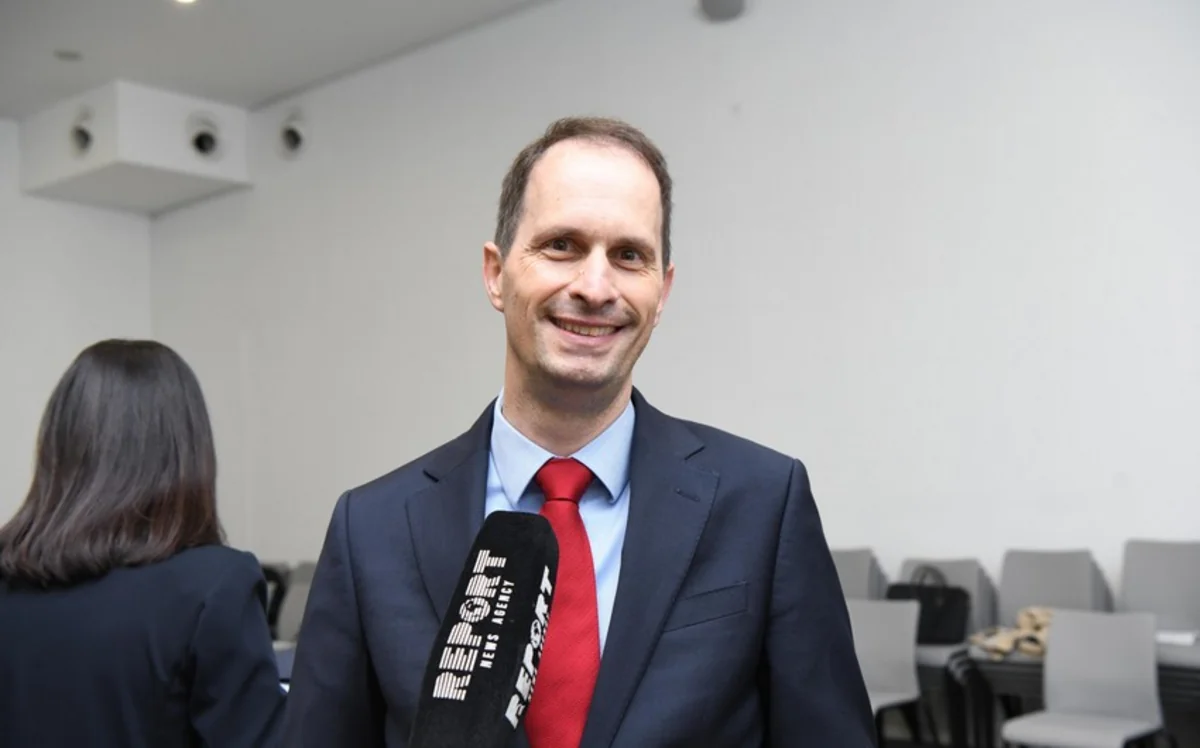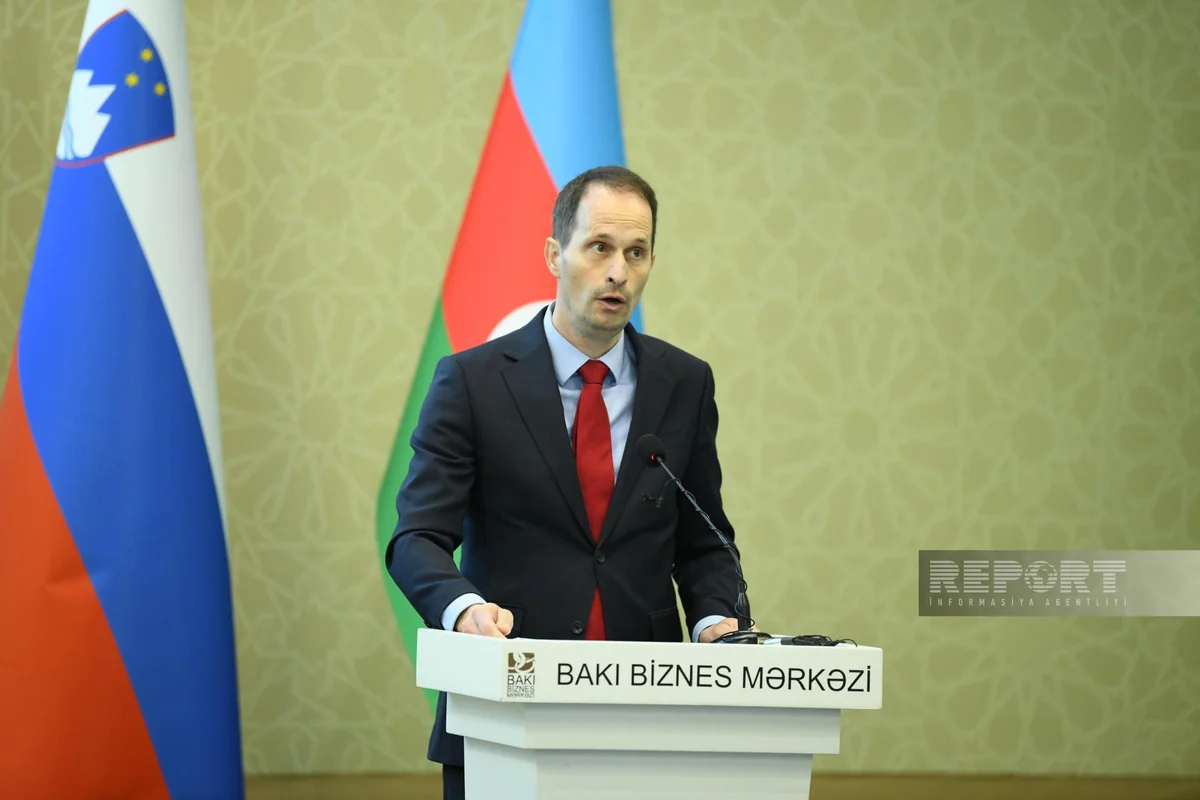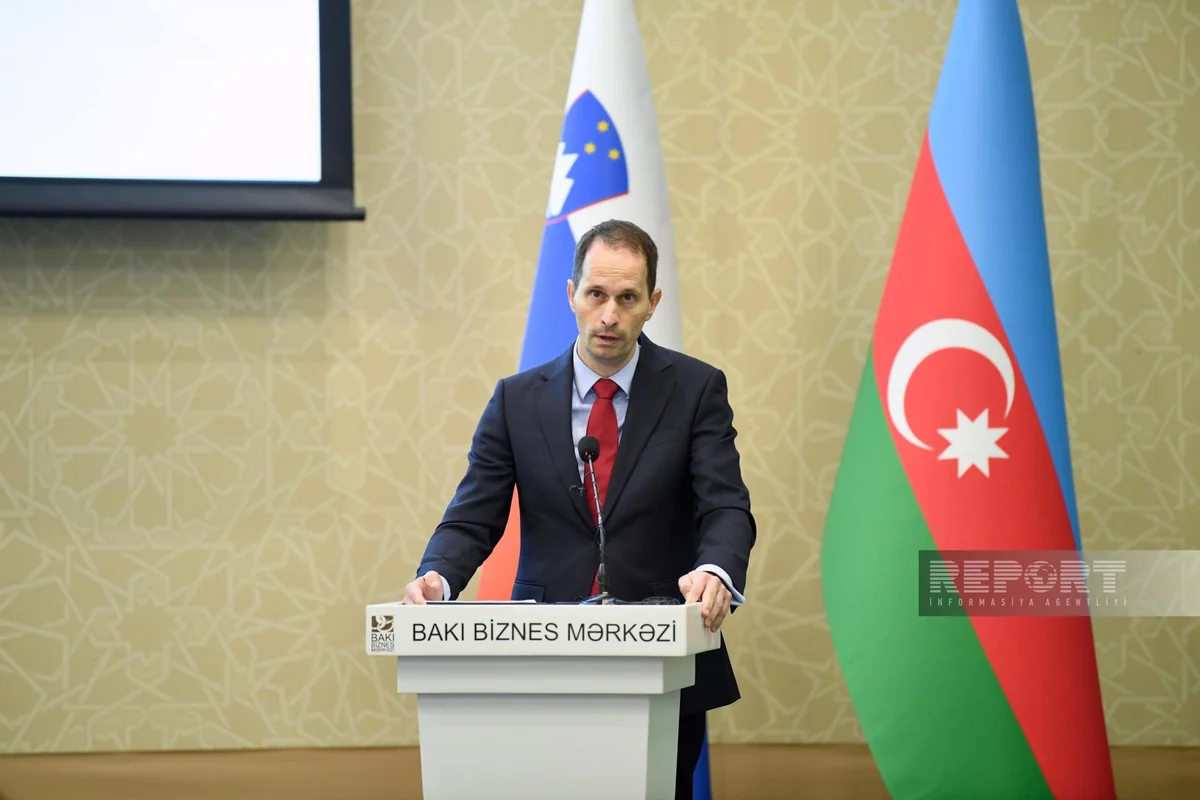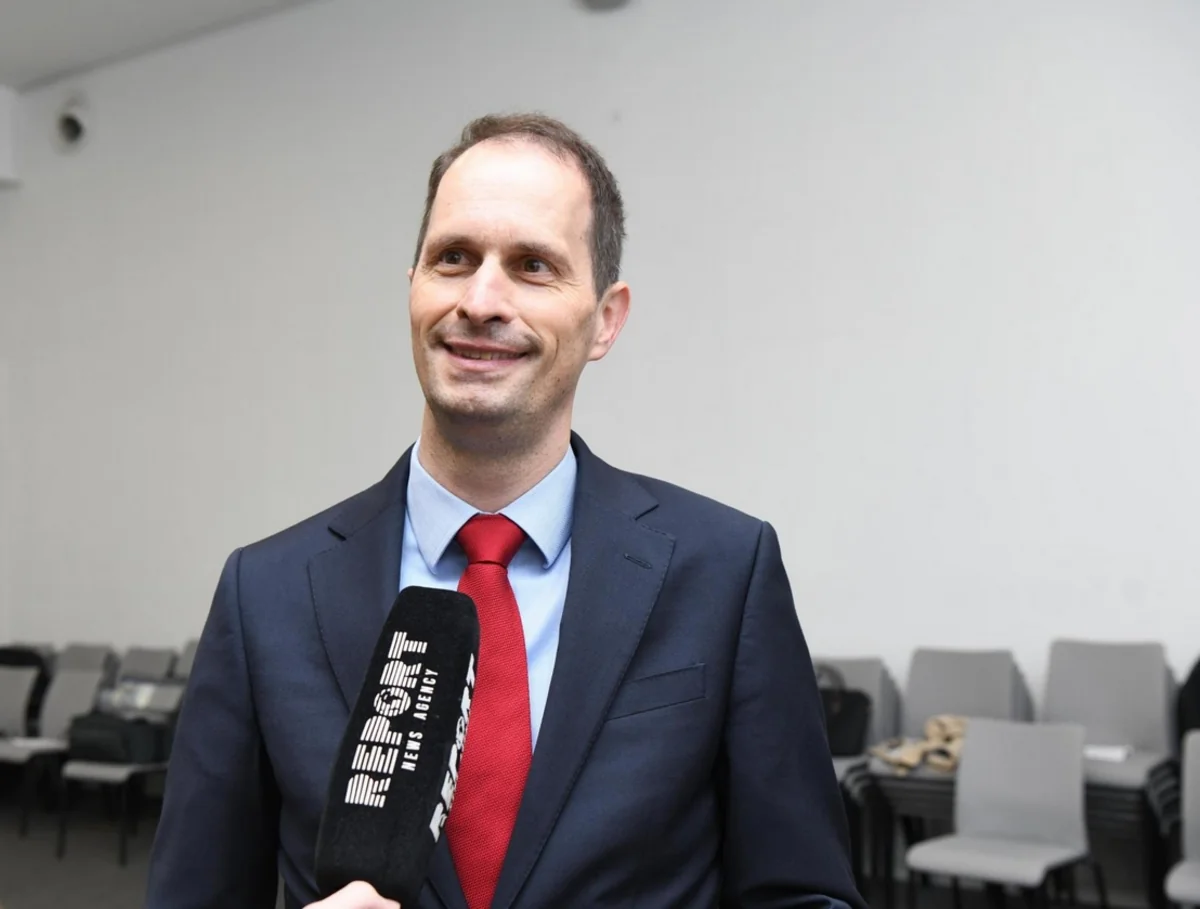Mitja Blaganje: Azerbaijan, Slovenia consider joint renewable energy projects beyond region - INTERVIEW
- 07 May, 2025
- 10:45

Slovenia is strengthening its position as a bridge between the EU and the South Caucasus by promoting economic diplomacy, digital innovation and sustainable development. One of Ljubljana's priorities is deepening the trade and investment partnership with Azerbaijan - from energy and logistics to pharmaceuticals and high technology.
In an interview with Report, Mitja Blaganje, secretary general of the Ministry of Economy, Tourism and Sports of Slovenia, spoke about the strategy for attracting foreign investment, prospects for participation in the Middle Corridor, interest in joint ventures with Azerbaijani companies and opportunities for digital and infrastructure cooperation.
Report presents the interview:
- What key measures is the Slovenian Ministry of Economy taking to attract foreign investment, including from South Caucasus countries, particularly Azerbaijan?
- The Slovenian Ministry of Economy, Tourism and Sport is actively implementing several strategic initiatives to attract foreign investment, with a particular focus on fostering economic ties with South Caucasus countries, including Azerbaijan. Key measures include bilateral business forums and working groups. Slovenia, in collaboration with Azerbaijan, organized the Azerbaijan-Slovenia Business Forum in Baku. This event, co-hosted by SPIRIT Slovenia and AZPROMO, brought together around 40 companies from both nations across sectors such as ICT, textiles, tourism, construction, and mechanical engineering. The forum concluded with the signing of a trade agreement between Azerbaijan’s Bestcomp Group and Slovenia’s Kontron, followed by B2B and B2G meetings aimed at fostering direct commercial and government-level partnerships.
Slovenia is targeting collaboration in key sectors where it possesses competitive advantages. These include digitalization, smart factories, renewable energy, and sports infrastructure. Slovenian companies such as C-Astral, Kontron, and Medex are exploring opportunities in ICT, renewable energy, and innovative food supplements. Additionally, Slovenia is open to investments in sports, from the development of sports infrastructure to supporting young talents.
A memorandum of understanding on energy cooperation has been signed, paving the way for increased collaboration in energy production, supply, and innovation. This includes the supply of Azerbaijani natural gas to Slovenia, enhancing regional and European energy security. Furthermore, discussions are underway regarding the Middle Corridor, a trade route connecting Europe and China, with potential cooperation between Azerbaijani and Slovenian ports.
By fostering closer ties between Slovenian and Azerbaijani businesses, Slovenia aims to create new opportunities for trade, investment, and innovation, contributing to the broader goal of regional stability.
These measures reflect Slovenia's commitment to enhancing economic cooperation with South Caucasus countries, leveraging its strengths in various sectors to attract foreign investment and promote mutual growth.
- What support tools or programs are available in Slovenia for foreign companies looking to establish offices or logistics hubs in the country?
- Slovenia offers a robust support system for foreign companies aiming to establish offices or logistics hubs within its borders.
SPIRIT Slovenia Business Development Agency is a single point of contact for foreign businesses and investors, providing strategic and operational support: Assistance with market entry, site selection, and connections to local authorities and industry experts (free of charge). For investors, the agency provides assistance throughout the whole investment process. It also provides ongoing support to ensure long-term success of foreign businesses in Slovenia. It is also assisting foreign companies in identifying suitable Slovenian suppliers and business partners.

Slovenia's strategic location and infrastructure developments make it an attractive logistics hub: Port of Koper is a key commercial port in the Northern Adriatic, providing the shortest route for goods between Asia and Central Europe. The government has earmarked EUR 17 billion for logistics and transportation infrastructure improvements through 2030, including upgrades to railway networks and highway projects.
The Slovenian government offers various incentives to attract foreign investment: Financial support for investments exceeding EUR 500,000 in sectors like industry, strategic services, and R&D. Corporate tax reliefs are available, including reductions for investments in start-up companies and employment of disadvantaged individuals. The Port of Koper operates as Slovenia's only free trade zone, offering customs duty exemptions and other trade facilitation measures.
Foreign companies benefit from a straightforward process to establish operations in Slovenia: Company Registration: The process is similar to other EU countries, with the possibility to complete part of the registration remotely. Legal Forms: Options include sole proprietorships, partnerships, and limited liability companies, with a minimum share capital requirement of EUR 7,500 for LLCs. Workforce Access: Foreign companies can hire local employees and relocate foreign staff, subject to Slovenian employment laws and work permit requirements.
SPIRIT Slovenia also focuses on supporting small and medium-sized enterprises (SMEs) and start-ups: Educational Programs: Provision of educational courses and resources to enhance competitiveness. Trade Fair Participation: Assistance with attending international trade shows and B2B events.
- How do you assess Slovenia’s role in developing transit and trade routes between Europe and Asia, with Azerbaijan’s involvement?
- The volume of goods arriving in Europe from Asia via the Middle Corridor has been increasing recently due to geopolitical circumstances (the war in Ukraine and the Middle East), but it remains modest. In the growing trade between Asia (especially China) and Europe - amounting to more than 10 million containers annually - the vast majority of goods (around 96%) arrive in Europe by sea, while the remaining 4% are transported via the Trans-Siberian Railway (the so-called Northern Corridor). The development of the Middle Corridor would offer a more economical and time-efficient route for transporting these goods. Naturally, we generally support and encourage all such initiatives that can contribute to increased trade, provided there is an underlying economic interest.
- What is the significance of the Middle Corridor (Trans-Caspian International Transport Route) in enhancing trade between our countries? Is Slovenia considering active participation in its development as part of a broader pan-European logistics strategy?
- In light of the Russia-Ukraine war, many logistics chains have begun to shift, including towards the so-called Middle Corridor. Azerbaijan plays a particularly important role in the development of the Middle Corridor. Slovenia’s deep-sea port, the Port of Koper, is in principle interested in participating within the framework of the Middle Corridor but is currently in the phase of gathering more information. At present, the Port of Koper handles a relatively small volume of cargo to and from Azerbaijan. Cooperation would be especially meaningful if a regular maritime connection were established from Georgia to Koper, or along the mentioned corridor to Turkey and then by sea to Koper. In such a case, cargo from China, as well as from Central Asian countries, could enter Central European markets via Koper (and vice versa, in the case of exports). It is also worth noting that the volume of goods transported by road between the two countries is currently quite modest.
- How much natural gas has Slovenia imported from Azerbaijan in recent years? What are the country’s current gas needs, and is an increase in supply being considered?
- The agreement between SOCAR and Geoplin is confidential, so we cannot give you its details. That said, we support and look forward to the continuation of their cooperation in the future. In 2023, Slovenia's natural gas consumption was approximately 0.8 billion cubic meters (bcm). Slovenia is striving to enhance its energy security by diversifying its supply sources, and Azerbaijan has emerged as a reliable and potential strategic partner in this effort.
- Is there interest in launching joint energy projects, including in renewable energy, small hydropower, or sustainable resource management?
- On April 4, 2025, in Baku, the ministers responsible for energy from both countries signed a Memorandum of Understanding (MoU) on cooperation in the field of energy between their respective ministries. This MoU provides a solid foundation to expand our cooperation with Azerbaijan in the energy sector, particularly in areas such as natural gas, renewable energy, digitalization of energy systems, and hydrogen.
- Are there plans to increase the number of direct flights between our countries to support tourism and business travel?
- Ministry of Infrastructure of the Republic of Slovenia and the Ministry of the Economy, Technology and Sport of the Republic of Slovenia are working hard on improving Slovenia's air connectivity with the aim of encouraging the establishment of new direct scheduled air routes to and from Slovenia. The Ministry of Infrastructure is therefore implementing the Call for Tenders for Enhanced Air Connectivity of Slovenia, the subject of which is the granting of state aid to air carriers for the start-up of operation of new air routes, for the carriage of passengers to or from a public airport in the territory of the Republic of Slovenia at which international air transport is performed, to a single landing point in the territory of the countries of the European Common Aviation Area (ECAA), since April 2023.
The Call also pursues two key development priorities of the Slovenian economy, namely the internationalisation and strengthening of foreign direct investment by determination of priority markets. The routes eligible for co-financing are defined in the Programme for enhanced air connectivity in the Republic of Slovenia. To date, the Call has resulted in seven closure dates for the submission of applications for aid, with a total of 5 beneficiaries selected. The 8th deadline has also been closed, but we have not yet selected the beneficiaries. In parallel, we are intensively looking for solutions that will improve Slovenia's air connectivity in the long term, as we are aware of the short-term effects of the time-limited tender. We are open to various forms of cooperation with airlines that would contribute to improving air connectivity in Slovenia in the long term and are interested in discussing the possibilities of cooperation.

- Following Slovenia’s success in the EU tender to establish a supercomputer and AI factory, do you see potential for digital cooperation with Azerbaijan in areas such as artificial intelligence, big data, and industrial digitalization?
- There are opportunities for cooperation in the field of scientific research, but cooperation with Azerbaijani companies is more challenging due to the European Union rules to which the Slovenian AI Factory is subject. Possibilities for forms of cooperation would be explored as soon as they are made more concrete by the Azerbaijani side.
- Is there interest in a technological partnership between our countries in areas such as automation, telecommunications, and smart logistics or infrastructure solutions?
- There is a growing interest in technological partnerships between Slovenia and Azerbaijan, particularly in areas such as automation, telecommunications, and smart logistics or infrastructure solutions. Recent developments indicate a mutual commitment to enhancing cooperation in these sectors.
In April 2025, the Azerbaijan-Slovenia Business Forum was held in Baku, bringing together companies from both countries to explore collaboration opportunities in various sectors, including information and communication technologies (ICT), automation, and smart logistics. During this event, a memorandum of cooperation was signed between the Slovenian company Kontron and the Azerbaijani firm Bestcomp, signaling a significant step towards joint technological initiatives.
The forum emphasized sectors such as unmanned marine vessels, maritime transport automation, and metal structure production, highlighting a shared interest in advancing smart logistics and infrastructure solutions. The establishment of the Azerbaijan-Slovenia Joint Working Group on Economic Cooperation further underscores the commitment to deepening ties in these technological areas.
Slovenia has been actively pursuing digital transformation, embracing technologies like artificial intelligence (AI), the Internet of Things (IoT), and blockchain. The government's initiatives aim to foster innovation across various sectors, creating a conducive environment for international technological partnerships.
Slovenia's telecommunications sector is robust, with significant investments in 5G infrastructure. The country's commitment to enhancing connectivity and digital services positions it as a strategic partner for collaborative projects in telecommunications and related technologies.
The recent engagements between Slovenia and Azerbaijan, coupled with Slovenia's focus on digital innovation, indicate a strong mutual interest in developing technological partnerships. These collaborations are poised to drive advancements in automation, telecommunications, and smart logistics, benefiting both nations' economic and technological landscapes.
The Slovene delegation in Baku this month focused on strengthening economic cooperation between the two countries, increasing trade exchange, and encouraging foreign investments, with an emphasis on the following sectors: pharmaceutical and chemical industry, renewable energy sources (small hydropower plants, photovoltaics), information and communication technology, electrical industry, construction, tourism, and sports.
- Are Slovenian companies expressing interest in participating in infrastructure and construction projects in Azerbaijan?
- Yes, Slovenian companies are actively expressing interest in participating in infrastructure and construction projects in Azerbaijan, particularly in regions undergoing significant development.
During the Azerbaijan-Slovenia Business Forum held in Baku in April 2025, Slovenian Deputy Prime Minister and Minister of Foreign and European Affairs, Tanja Fajon, highlighted the potential for cooperation in sectors such as construction, infrastructure, and the development of small hydropower plants. She emphasized that Slovenian companies have already expressed interest in these areas, aiming to contribute to Azerbaijan's ongoing reconstruction efforts, especially in the Karabakh and Eastern Zangazur regions.
Azerbaijani Foreign Minister Jeyhun Bayramov also invited Slovenian companies to join the reconstruction initiatives in these liberated territories, underscoring the opportunities available for foreign investors in the region's development projects.
Furthermore, the establishment of the Azerbaijan-Slovenia Joint Working Group on Economic Cooperation aims to facilitate and identify concrete business and investment opportunities between the two countries, including in the infrastructure and construction sectors.
These developments indicate a mutual commitment to strengthening economic ties and collaboration in infrastructure projects, with Slovenian companies poised to play a significant role in Azerbaijan's development initiatives.

- Are there opportunities being considered for joint modernization and automation of production facilities, particularly in the industrial and maritime sectors?
- As part of the business delegation in April, companies with a strategic focus on the industrial and maritime sectors were selected, particularly those offering advanced solutions in the fields of modernization and automation of production facilities. Their inclusion reflects a targeted approach to fostering international partnerships and knowledge exchange in areas where technological upgrades and process optimization are increasingly critical to competitiveness and sustainable growth.
- What technological solutions used in Slovenian agriculture and the food industry could be adapted for the Azerbaijani market?
- Digitalisation in the agri-food processing industry enables greater traceability of food, enhanced control over food safety and quality, monitoring of material flows for a faster transition to a circular and bioeconomy, more efficient business operations, and improved food labelling. In the food industry, digital technologies and automated production systems are the foundation for the successful operation of Slovenian companies. Their development is already at a satisfactory level in Slovenia. Artificial intelligence presents an opportunity for further development and digitalisation of the entire food supply chain. The Ministry of Agriculture, Forestry and Food believes that, for Azerbaijan's food industry as well, monitoring and integrating technological advancements is crucial for achieving competitiveness.
- How promising do you consider cooperation in agricultural processing and sustainable agribusiness?
- A potential area of opportunity in the field of sustainable agriculture could be cooperation between Slovenian competent authorities and their counterparts through the sharing of extensive experience and knowledge related to agricultural policy measures that promote the adoption and implementation of environmentally friendly farming practices aimed at protecting natural resources and biodiversity. More broadly, Slovenia is also interested in strengthening economic cooperation between the two countries.
- Beyond the agreement between Kontron and BestComp, what outcomes resulted from the participation of Slovenian companies in the Azerbaijan-Slovenia Business Forum? Were any preliminary agreements reached in other sectors?
Yes, beyond the agreement between Kontron and Bestcomp, the Azerbaijan-Slovenia Business Forum held in Baku in April 2025, which was organized by SPIRIT Slovenia and AZPROMO led to several notable outcomes, including preliminary agreements in various sectors.
Azerbaijani Foreign Minister Jeyhun Bayramov announced that preliminary agreements had been reached between Azerbaijani and Slovenian companies during the forum. These agreements span sectors such as construction, infrastructure, and energy, indicating a broadening of bilateral economic cooperation. Slovenian companies were invited to participate in Azerbaijan's reconstruction efforts, particularly in the Karabakh and Eastern Zangazur regions. These areas are undergoing significant redevelopment, offering opportunities in infrastructure, construction, and related services.
Azerbaijan and Slovenia signed an MoU during the forum, aiming to enhance cooperation in various fields, including economic development, trade, and investment. The two countries explored possibilities for joint production in the pharmaceutical sector, reflecting a mutual interest in expanding collaboration in healthcare and related industries. These initiatives for collaboration opportunities will be transferred to Slovenian companies operating in this industry. These kinds of developments underscore a mutual commitment to strengthening economic ties and exploring collaborative opportunities across diverse sectors.
Currently, 12 companies with capital originating from Azerbaijan operate in Slovenia, while, according to the Sloexport database of Slovenian exporters, 60 Slovenian companies export to Azerbaijan. Due to its strategic location between Europe and Asia, Azerbaijan represents an increasingly attractive market for Slovenian companies.
- Are there plans to establish joint ventures with Azerbaijani partners to access third-country markets? Which industries offer the most potential in this regard?
- Further networking of companies, exchange of experiences, and possibly joint ventures in third markets can, in our view, contribute to greater economic growth and mutual benefits.
Cooperation between Slovenia and Azerbaijan has great potential, and we believe that together we can seize strategic opportunities and contribute to more stable and resilient economic ties between Europe and Asia.
During the Azerbaijan-Slovenia Business Forum in Baku in April 2025, Slovenian Deputy Prime Minister and Minister of Foreign and European Affairs Tanja Fajon emphasized the importance of joint ventures as a means to expand into new markets. She highlighted that both countries possess complementary capabilities that, when combined, can enhance their competitiveness in third-country markets.
Azerbaijani Foreign Minister Jeyhun Bayramov echoed this sentiment, noting that the collaboration between Azerbaijani and Slovenian companies could lead to significant opportunities beyond their bilateral relations.
Several sectors have been identified as having high potential for joint ventures targeting third-country markets. Slovenian companies like Kontron have already established partnerships with Azerbaijani firms such as Bestcomp Group, focusing on telecommunications solutions for various industries. Both nations are investing in renewable energy projects, including solar and wind power, which could be expanded to other markets through joint initiatives. Slovenia's established pharmaceutical industry and Azerbaijan's growing healthcare sector present opportunities for joint production and distribution in neighboring regions. Collaborative efforts in reconstruction projects, particularly in areas like Karabakh and East Zangezur, can serve as a model for joint ventures in other countries requiring infrastructure development.
The establishment of the Azerbaijan-Slovenia Joint Working Group on Economic Cooperation serves as a platform to identify and develop joint venture opportunities. This group focuses on aligning strategic interests and facilitating partnerships that can extend beyond bilateral projects.
In summary, both Slovenia and Azerbaijan are committed to forming joint ventures that leverage their respective strengths, aiming to penetrate third-country markets across various industries.
- What will be the format of the joint Azerbaijani-Slovenian working group? Which areas will be prioritized, and is there already a preliminary list of business or investment initiatives?
- As part of the visit, the first meeting of the Joint Working Group on Economic Cooperation between Slovenia and Azerbaijan took place in the Azerbaijani capital, Baku. The Joint Working Group, established on the basis of a memorandum of cooperation between the two countries, is tasked with establishing a regular institutional platform to strengthen and enhance economic relations. The purpose of the working group is to identify concrete cooperation projects, eliminate potential administrative barriers to market entry, and develop guidelines to facilitate access of Slovenian companies to the Azerbaijani market and vice versa. Specifically, we aim to strengthen cooperation in the fields of the pharmaceutical and chemical industries, renewable energy sources, information and communication technology, electrical industry, construction, tourism, and sports.
- What role does Slovenia see for Azerbaijan within the international IRENA agenda, especially in light of Slovenia’s upcoming chairmanship in 2025? What joint initiatives could be pursued?
- Slovenia assumed the Presidency of the IRENA Assembly for a one-year term this January. While this role does not carry any additional decision-making authority over IRENA’s work programme, it serves as a strong signal of Slovenia’s commitment to international cooperation in advancing renewable energy, including with Azerbaijan.
